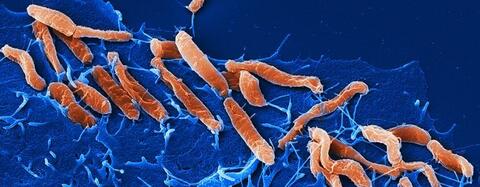
Community-Acquired Infections at Mucosal Interfaces
The aim of this research area is to improve the diagnosis, treatment and prevention of bacterial and viral infections of the digestive, genitourinary and respiratory tracts acquired in everyday life.
We are exposed to many infectious agents in our daily lives. Our mucous membranes are a key entry point for pathogens, but they also form an important protective barrier. Mucous membranes are found throughout the body. They play a central role in the entire digestive, respiratory and urogenital systems.
Everyday infections such as colds, gastrointestinal infections or sexually transmitted diseases are caused by a variety of bacteria, viruses and parasites. Most are harmless and recover quickly. However, there are also dangerous pathogens that can cause serious or even fatal disease, especially in high-risk groups or where health care is poor.
According to the WHO, approximately 1.5 million people worldwide die of diarrhoeal disease alone. Children under the age of five living in developing countries are particularly affected by conditions such as diarrhoea and vomiting all the way through to malnutrition and death. Alongside the pathogens responsible for diarrhoeal disease, one of the most important gastrointestinal pathogens is Helicobacter pylori. It is the main cause of gastric ulcers and gastric cancer and it is estimated that half the population is infected.
The DZIF research area "Community-Acquired Infections at Mucosal Interfaces" aims to improve diagnosis, treatment and prevention of acquired bacterial and viral infections of the digestive system, the urogenital system and the respiratory tract. Amongst other things, scientists develop new treatment strategies that selectively target specific bacteria or pathogen groups. They research the natural microbiome in the stomach, intestines and genital area and its role in the development of and protection against diseases. Alongside this, both preventive and therapeutic vaccines are being developed.
Central Themes
-
Pathoblocker development
-
Scientists search for virulence factor inhibitors that target gastrointestinal pathogens such as EHEC, Salmonella and Helicobacter pylori as well as sexually transmitted bacteria like Chlamydia.
-
Vaccine development
-
The focus is on vaccines against the gastric pathogen Helicobacter pylori and noroviruses—and potentially also against the cause of urogenital infections.
-
Microbiome-based biomarkers and interventions
-
Research is being conducted into the composition and function of the microbiome and its role in the development and prevention of infectious diseases and their progression. The aim is to improve the bacterial flora to specifically benefit the patient.
-
Clinical trials and epidemiology of community-acquired infections
-
Through epidemiological observations and observational studies, DZIF scientists are improving the prediction of virulence and antibiotic resistance of gastrointestinal pathogens and the risk of infection in specific groups of people.



